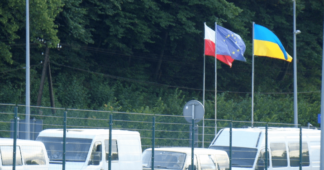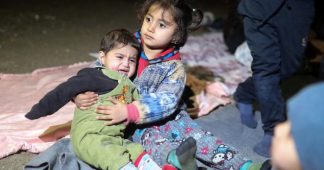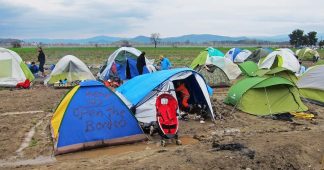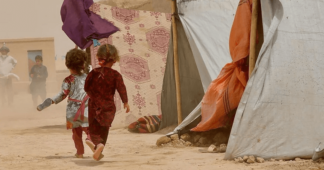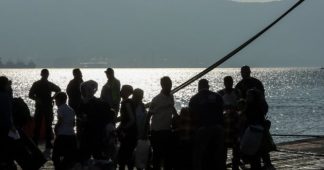By Martin Kreickenbaum
Mar 9, 2022
More than 1.5 million people have fled Ukraine since the beginning of the war on 24 February. The UN Refugee Aid Organization (UNHCR) has described it as the “fastest growing refugee crisis since the Second World War” and expects up to four million refugees. However, while the European Union is granting protection to Ukrainian citizens for an initial year, refugees from other countries are being singled out and excluded.
Last Friday, for the first time, the European Union enacted the directive on the “mass influx” of refugees, which must be implemented by all Member States. The directive grants refugees the right to reside for an initial period of one year without going through a complex asylum procedure, with the option of extending it by a further two years. Refugees are also immediately entitled to social benefits, accommodation and access to education for children of school age.
Poland has so far welcomed a total of almost one million refugees, half of whom are children. Last weekend alone, around 250,000 refugees arrived in Ukraine’s western neighbour via the Medyka and Korczowa border crossings. By Sunday, around 227,000 refugees had been registered in Romania, 163,000 in Hungary and 114,000 in Slovakia. In Moldova, which is not part of the EU, more than 250,000 people have already been admitted from Ukraine.
Aid for the refugees has mainly been organised thanks to an overwhelming willingness of the population to help. Government agencies are very cautious and hardly able to coordinate volunteers offering aid. In Poland, thousands of volunteers are working to sort and distribute donations, organise ridesharing or provide accommodation. The majority of the refugees are accommodated directly with relatives, acquaintances or former neighbours. Already before the outbreak of the war, almost one million immigrants from Ukraine lived and worked in Poland.
According to official data, around 37,500 refugees from Ukraine have been registered so far in Germany. Most of them are arriving to Berlin by train, where volunteers are also primarily involved in providing shelter, clothing and food for people seeking protection.
The German Interior Minister Nancy Faeser (Social Democrats) told the Bild am Sonntag that “we want to save lives, it doesn’t matter about the passport,” and claimed that all refugees from Ukraine would be admitted regardless of their nationality. But the reality is quite different.
The Tageszeitung reported on the systematic sorting out of refugees at the German-Polish border. Border guards of the Federal Police then go through the fully occupied trains and prevent people with dark skin from continuing. A police spokesman confirmed that the number of refugees who had to leave the trains to establish their identity in Frankfurt (Oder) was already in the three-digit range on Thursday, commenting, “And yes, most of them are from Africa.” The federal police, however, do not stop people based on their appearance, the spokesman insisted.
This claim lacks all credibility. According to official information, the border guards are looking for so-called “free riders,” as the Federal Police puts it. This refers to people who would “exploit” the situation in order to get to Germany. They are then accused of “unauthorised border crossing,” which the police say must be prosecuted. This inhumane criminalisation of refugees who are not in a position to legally acquire a visa almost inevitably leads to illegal “racial profiling” by the police.
This discrimination on the basis of the skin colour and ethnic origin of refugees demonstrates the hypocrisy of the EU’s refugee policy. According to official information, the temporary one-year right to reside is also granted to people who do not have a Ukrainian passport and who were living in Ukraine to work or study. However, evidence is required to prove permanent residency in Ukraine. Anyone who cannot provide this evidence is excluded. In addition, Ukraine has been a transit country for thousands of refugees from Afghanistan, Syria, Chechnya, Somalia and Iraq, who are now also not covered by the EU’s reception regime.
The division of refugees into those who are welcome and those who are unwelcome already takes place in Ukraine. Last week, the French television station France24 reported on students from Africa who had been rejected at the border with Poland.
Moustapha Bagui Sylla from Guinea, who fled from the city of Kharkiv, reported: “They stopped us at the border and declared ‘blacks are not allowed.’”
Michael from Nigeria added: “They don’t let Africans in. People with dark skin and without a European passport are not allowed to cross the border. They’re pushing us back just because we’re black. And yet we are all human beings. They should not discriminate against us because of our skin colour.”
Bagui Sylla went on to say that the Ukrainian soldiers had told him that they were rejecting non-Europeans on the orders of the Polish border guards.
News site InfoMigrants contacted refugees from Bangladesh who were to be deported by the Ukrainian authorities and were stuck in a deportation prison near the city of Mykolaiv in the middle of a combat zone.
Further refugees are being detained near the city of Kivertsi in a deportation complex whose grounds have recently been converted into a base for the Ukrainian military. “Russia has mainly attacked military facilities. That’s why we’re afraid of being bombed. They still locked us up here with hundreds of migrants from India, Afghanistan, Pakistan and Arab countries, including women and children,” Riadh Malik reported.
Confronted with the unequal treatment of refugees from Ukraine, Antonio Vitorino, Director General of the International Organisation for Migration, expressed concern about the violence and xenophobia against refugees from third countries who wish to leave Ukraine: “To put it plainly, discrimination on the grounds of race, ethnic origin, nationality or residence status is unacceptable.”
However, Vitorino did not mention the crying unequal treatment of Ukrainian refugees vis-à-vis the people who were prevented from entering the EU last autumn and winter by more than ten thousand Polish border guards using tear gas and pepper spray on the Belarusian-Polish border. Neither journalists nor aid organisations were granted access to the border area. At least 15 refugees from Syria, Iraq and Afghanistan froze or starved to death in the forests, including women and children, due to the relentless determination to repel refugees at all costs at the EU’s external borders.
The EU member states continue to sort out the “unwelcome refugees” after their arrival. For example, last Wednesday at the UN Human Rights Council in Geneva, the Hungarian Foreign Minister Peter Szijarto stated that although third-country nationals are allowed to enter Hungary, the Hungarian government only “organises transport to the nearest airport so that they can return to their countries of origin.” In other words, they are deported in cold blood.
The Bulgarian Prime Minister Kiril Petkov most clearly expressed the inhuman distinction between welcome and unwelcome refugees. The refugees from Ukraine are “not the refugees we are used to,” he told the press. “They are Europeans, smart and educated people, some of whom are even IT specialists. No European country is afraid of them.”
The same racist tropes were employed by many journalists who reported on the refugees. CBS and BBC correspondents stressed that the refugees are different because Ukraine is “not a third-world country,” such as “Afghanistan or Iraq,” but “European and civilized.”
The main reason for the unequal treatment of refugees is obvious. The refugees from Ukraine are fleeing the Russian intervention. Although NATO has provoked the invasion by its aggressive war drive against Russia, the refugees are shown exclusively as victims of “Russian aggression.” They are used to incite hostility against everything Russian and to justify NATO’s arms deliveries to Ukraine and plans for rearmament and war.
This does not change the EU’s thoroughly reactionary refugee policy. Even if the borders are currently open to refugees from Ukraine and they are spared the humiliating and oppressive asylum procedure, the walls of Fortress Europe remain insurmountable for all other refugees. More than 1,500 people fleeing the wars waged by the imperialist powers in Africa and the Middle East lose their lives every year in the Mediterranean alone.
In Libya, at least one hundred thousand refugees are being held in detention camps under appalling conditions. If they manage to escape from the camps, a life-threatening crossing in tiny inflatable boats across the Mediterranean and the associated risk of drowning or being brutally pushed back by the European border guards awaits them.
Published at www.wsws.org
We remind our readers that publication of articles on our site does not mean that we agree with what is written. Our policy is to publish anything which we consider of interest, so as to assist our readers in forming their opinions. Sometimes we even publish articles with which we totally disagree, since we believe it is important for our readers to be informed on as wide a spectrum of views as possible.
